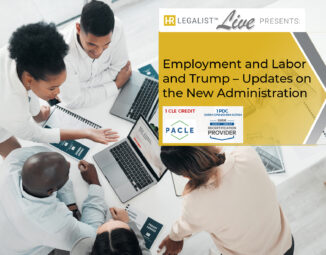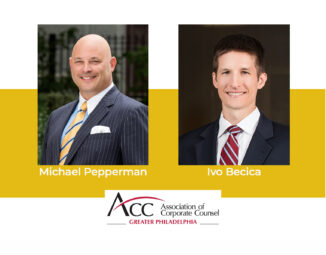Omarosa’s NDA Battle — Confidentiality and Context in the Workplace
The business world has much more to learn from the Omarosa Manigault White House battle than just fashionable workplace attire and a flair for the dramatic. The battle between the White House and Omarosa over the scope of her disclosures brings the issue of Non-Disclosure Agreements (NDA), and their efficacy and enforceability to the forefront. Employers frequently seek to use NDAs as a sword once the employment relationship is broken or a termination takes place. However, employers often require such agreements in order to broadly limit disclosure far beyond what is legally enforceable. Reaching in this manner can lead to legal liability, nullification and an ethical quagmire.
Courts have struggled for decades to define and enforce reasonableness in the context of NDAs. However, the legal debate over NDAs has only now entered public debate due to disputes amongst notable figures like Omarosa or Stormy Daniels. Further complicating is that the enforceability of these agreements is also affected by the United States Constitution, state Constitutions, and other state laws, as well as practices and Regulations of the various government agencies.
The Omarosa White House battle over disclosures illustrates that in the world of NDAs context is everything. Omarosa signed two NDAs – one while working as a campaign staffer and the other after she was employed as a member of the Trump Administration staff. While threats of enforcement as to the agreement she signed while part of the administration have been bantered about, it appears that the legal battle will focus on an NDA she signed while working on the campaign. This is a sound strategic decision as the enforceability of such an agreement is heavily, and sometimes completely, dependent upon the context and/or relationship between the parties. Even identical agreements with the same signatories signed can result in different outcomes. An agreement signed between Omarosa and the Trump Campaign is an agreement between a private individual and a campaign – private entities. The same agreement signed by the government and a government employee is likely illegal and unenforceable.
Government Employees
The Washington Post obtained a copy of a draft of the NDA signed by Trump Administration staffers and it focused on disclosure of “confidential” information. The definition of the term was only clarified to include “information” “learn[ed]” or “gain[ed]” “access” to while working in the White House. Even if we could further clarify the language, it’s likely the agreement is unenforceable and perhaps illegal. For example, federal whistleblower laws likely provide protections in several scenarios and would certainly protect an employee exposing corruption. Also, the Freedom of Information Act requires federal agencies to disclose any information sought under the Act, unless it falls under nine exemptions. Exemptions include disclosure of personal information and information relating to law enforcement, national security, etc. Therefore, there are many avenues for disclosure of information for government employees. One of the broadest avenues for disclosure, despite an executed NDA, in this context is the First Amendment protection for freedom of speech.
The First Amendment states: “Congress shall make no law respecting an establishment of religion, or prohibiting the free exercise thereof; or abridging the freedom of speech, or of the press; or the right of the people peaceably to assemble, and to petition the government for a redress of grievances.” Therefore, Omarosa, like all other government employees has the right, within certain limitations, to exercise her freedom of speech, which could include disclosing non-classified information and criticizing the Trump Administration. Whether she met her ethical obligations as a barred attorney, is a different question.
The First Amendment however is one of the most misunderstood parts of the Constitution. Aggrieved employees and the public at large are often under the misconception that they have a right to free speech regardless of context. However, the First Amendment only restricts the government’s ability to infringe on an individual’s right to speech. Accordingly, the protections for speech beyond the governmental context, must be born out of other laws or other specific legal provisions. Therefore, private employers can contract with employees to limit their speech or ability to disclose information, as long as they do not run afoul of those other legal protections. Employers that overreach via overbroad NDAs risk invalidation of such an agreement or liability for overreaching.
Non-Government Employees
Business leaders have a real interest in protecting their strategic, competitive and trade information. NDAs are often a great tool for enacting such protections. However, management often forgets or disregards the web of laws and regulations that must be accounted for in order to effectively enforce such provisions.
NLRB Enforcement of the NLRA for All Employees
The National Labor Relations Board (NLRB) is charged with enforcing the National Labor Relations Act regardless of whether a workforce is unionized. One of the NLRB’s main focuses with non-unionized workplaces are the enactment of confidentiality agreements that the NLRB has determined infringes on employees’ rights to engage in protected concerted activity. Thus, employers enacting overly broad NDAs are vulnerable to NLRB action, injunction and rescission. Inclusion of broad and ambiguous descriptions or categories of protected information is problematic and will make the NDA in question vulnerable to NLRB action.
EEOC and the SEC
Employees have a specific right to communicate regarding and to participate in filing complaints with the Equal employment Opportunity Commission (EEOC) or aiding in such a filing. NDAs prohibiting or discouraging employees from engaging in specifically protected activities will be unenforceable (at least with regard to those sections). Courts have held that because the EEOC acts on behalf of the public interest in preventing employment discrimination, an NDA is overbroad if it prevents an employee engaging in these activities.
Similarly, the Securities Exchange Commission (SEC) now prohibits actions to impede employees from communicating directly with the SEC about possible violations. The prohibition explicitly includes the enforcement of, or threatened enforcement of, confidentiality agreements to stop such communications.
Jurisdictional Differences as to Legal enforcement
Reasonableness and the actual damage the disclosure will cause to the business in question is often the focus of judicial review. However, state law is the primary guide for enforcement of NDAs and there are differences as to how courts in different jurisdictions assess enforceability.
Whereas some states are willing to revise, modify or delete just the offending portion of an NDA, other states refuse to enforce the NDA in its entirety. Delaware, New Jersey and Pennsylvania are reformation states. Reformation in this context means that the court can take it upon itself to re-write the provision in question for consistency with the parties’ intent and compliance with state laws. Connecticut, Georgia and Illinois are blue pencil states. Blue penciling is a mechanism for courts to strike offending portions of the NDA while enforcing those provisions that pass legal muster.
The most concerning judicial approach to enforcement for employers is the pencils down approach – all or nothing. South Carolina, Virginia, Nebraska and Arkansas typically deem restrictive covenants void if one of the restrictions is unenforceable. Private employers staring down the face of what occurred in the Omarosa fact pattern would be astounded to learn that after they took care to obtain an executed NDA, and an employee surreptitiously taped conversations that were otherwise thought to be private that a court could easily invalidate the NDA as a whole.
The differences between states don’t end with the judicial approaches to enforcement. For example, definitions as to what is “confidential,” “trade secret” or “reasonable” vary from state to state. Employers operating in multiple jurisdictions relying upon NDAs must review and account for the varying legal standards for the venues in which they operate.
While it is tempting to use the ongoing Omarosa drama and cable new appearances as a diversion from our otherwise packed work weeks, company confidentiality and coffers may be at risk if there are no lessons learned.
CLICK HERE FOR ARTICLE ON JD SUPRA




